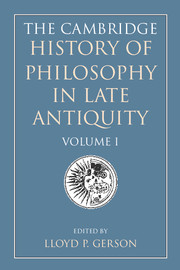Book contents
- Frontmatter
- General introduction
- I Philosophy in the later Roman Empire
- II The first encounter of Judaism and Christianity with ancient Greek philosophy
- III Plotinus and the new Platonism
- Introduction to Part III
- 17 Plotinus
- 18 Porphyry and his school
- 19 Iamblichus of Chalcis and his school
- IV Philosophy in the age of Constantine
- V The second encounter of Christianity with ancient Greek philosophy
- Map 1 The Byzantine Empire, c. 500
18 - Porphyry and his school
from III - Plotinus and the new Platonism
Published online by Cambridge University Press: 28 May 2011
- Frontmatter
- General introduction
- I Philosophy in the later Roman Empire
- II The first encounter of Judaism and Christianity with ancient Greek philosophy
- III Plotinus and the new Platonism
- Introduction to Part III
- 17 Plotinus
- 18 Porphyry and his school
- 19 Iamblichus of Chalcis and his school
- IV Philosophy in the age of Constantine
- V The second encounter of Christianity with ancient Greek philosophy
- Map 1 The Byzantine Empire, c. 500
Summary
LIFE AND WRITINGS
Life
Porphyry was born in 234 in Tyre, of probably wealthy parents. His original name, Malchos, which suggests a non-Greek or at least mixed Greco-Syrian background, was Hellenized to Porphyry (Malchos means ‘king’). This seems to have occurred through his teachers and fellow students rather than at his own instigation. He may have studied locally at Caesarea, where he is said to have at least seen Origen, before enrolling with Longinus in Athens (cf. 12T). It is doubtless with the polymath Platonist Longinus that he developed his own taste for learning and scholarship in literature and history as well as in philosophy. He joined Plotinus in Rome in 263, a bold but not altogether unorthodox move as Plotinus was at this time clearly making a name for himself both in Athens and further afield, judging by Longinus’ interest in his work and a number of adherents of international origin, such as Amelius. This encounter with Plotinus had a major impact on Porphyry’s Platonism as he slowly began to accept and enthusiastically defend many of Plotinus’ new interpretations. It is, however, important to realize that he would hardly have regarded Plotinus as the harbinger of a totally new phase in Platonic philosophy, a status first accorded to him by Proclus over a century later (Procl. Theol. Plat. 1.1, vol. 1.6.19). For Porphyry, Plotinus was another, if highly thoughtful and stimulating, exponent of the Platonic tradition that we, following Proclus, rightly see as taking a new direction with Plotinus.
Keywords
- Type
- Chapter
- Information
- The Cambridge History of Philosophy in Late Antiquity , pp. 325 - 357Publisher: Cambridge University PressPrint publication year: 2000
- 3
- Cited by

